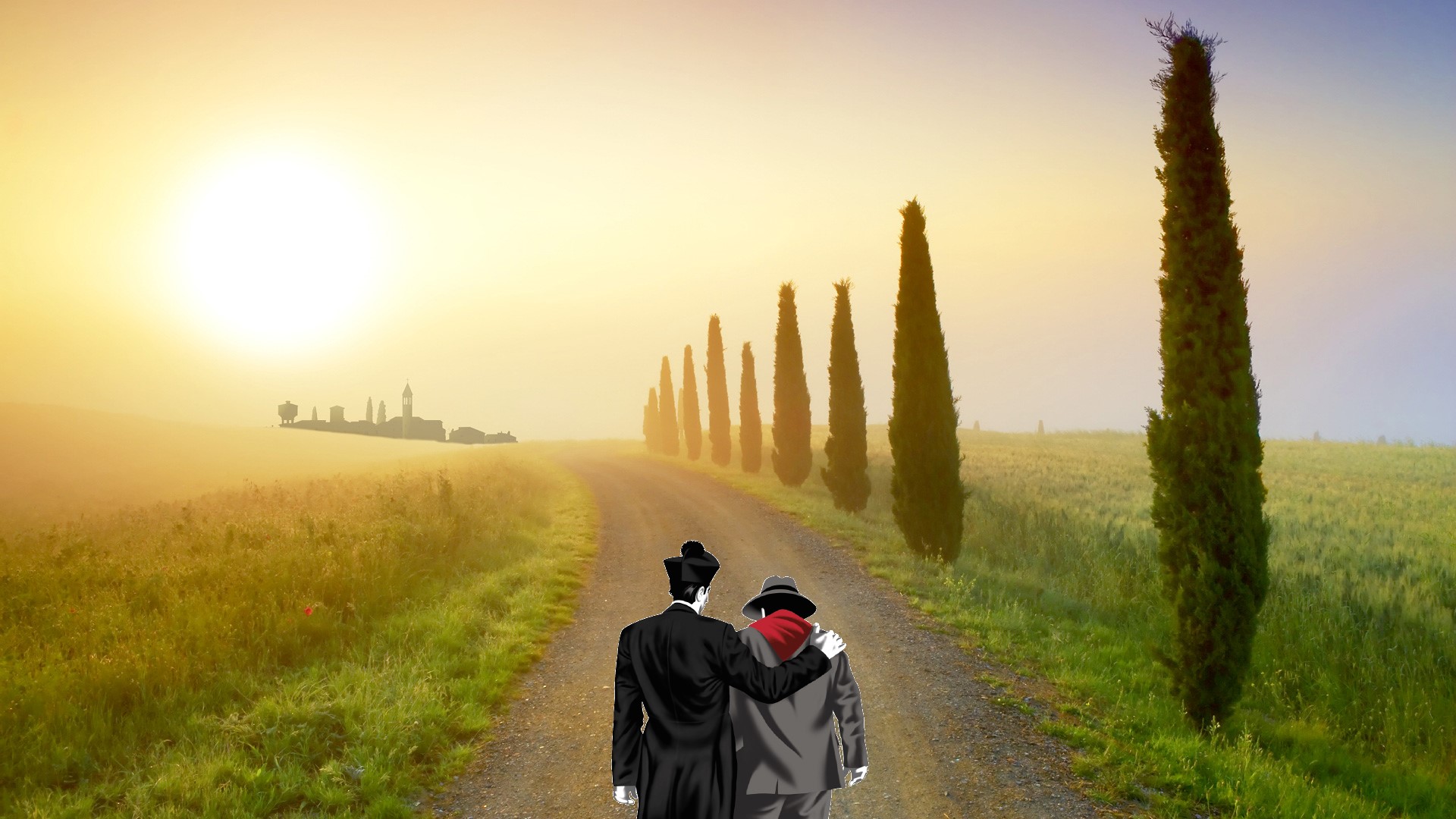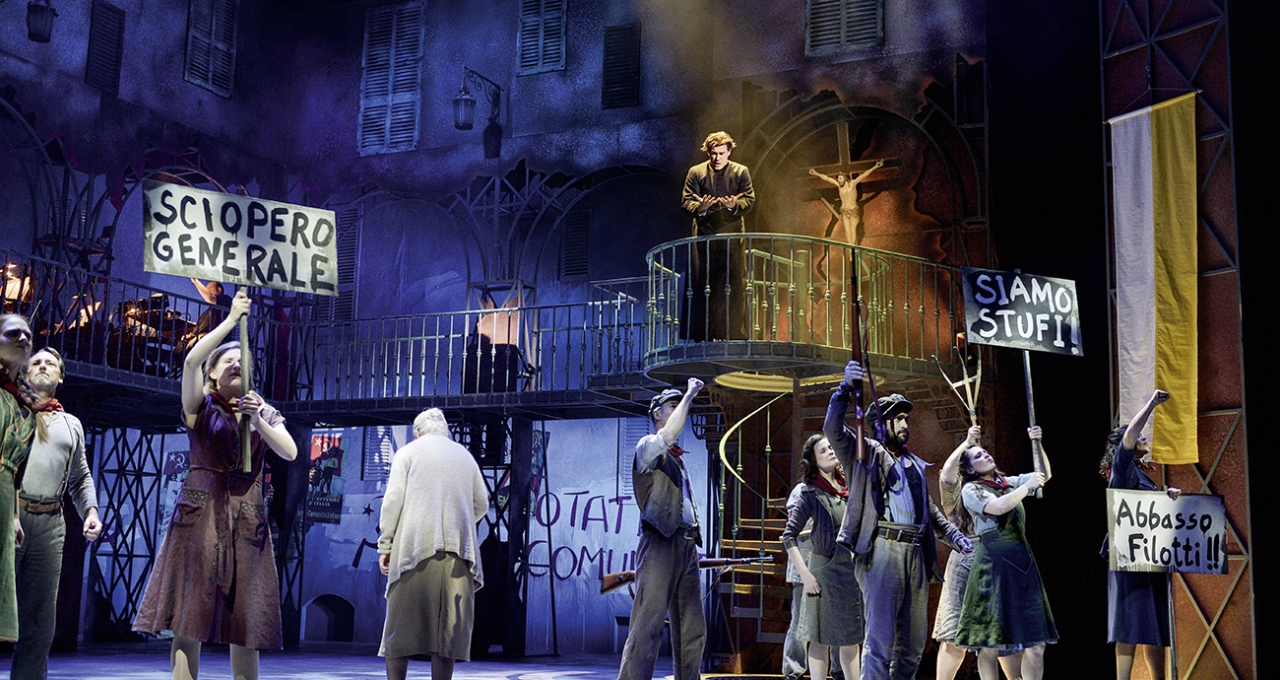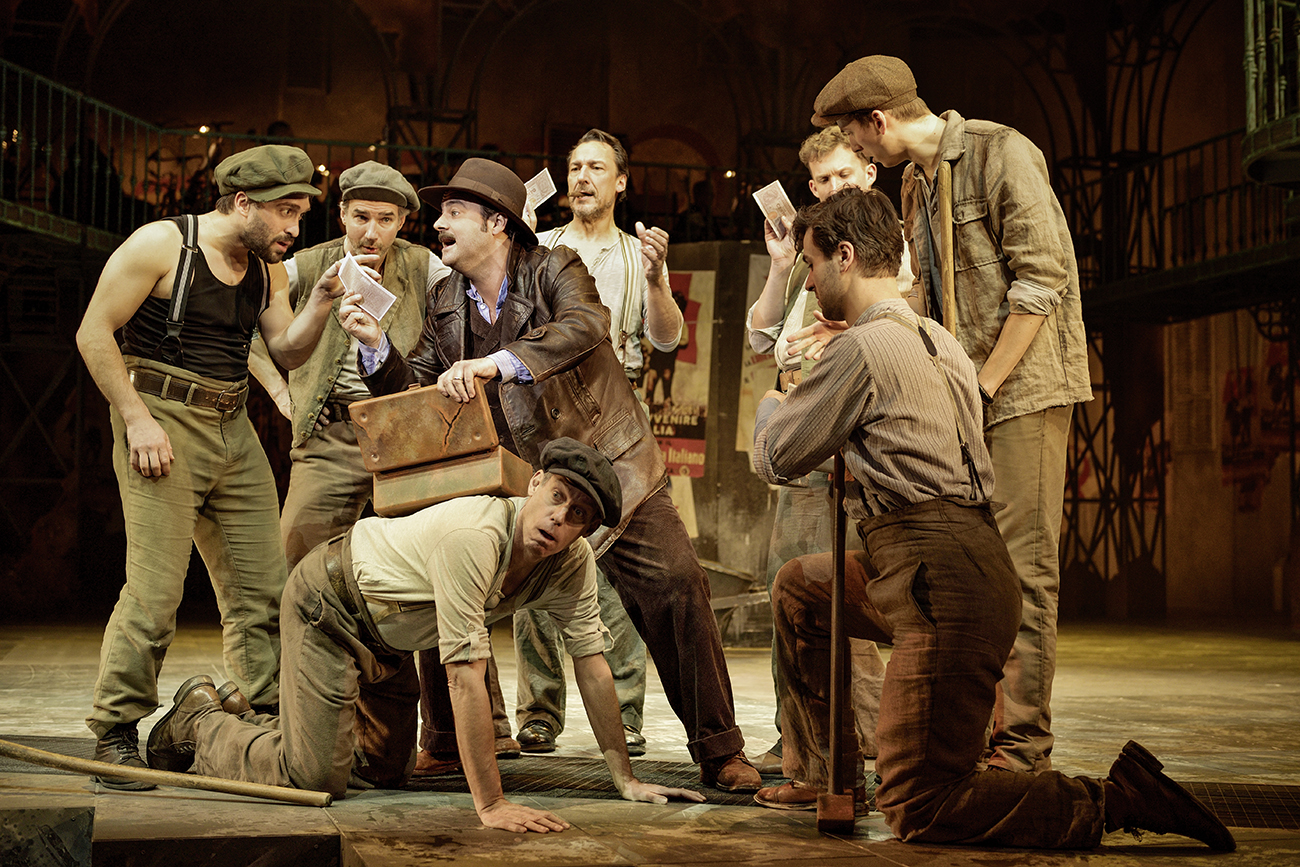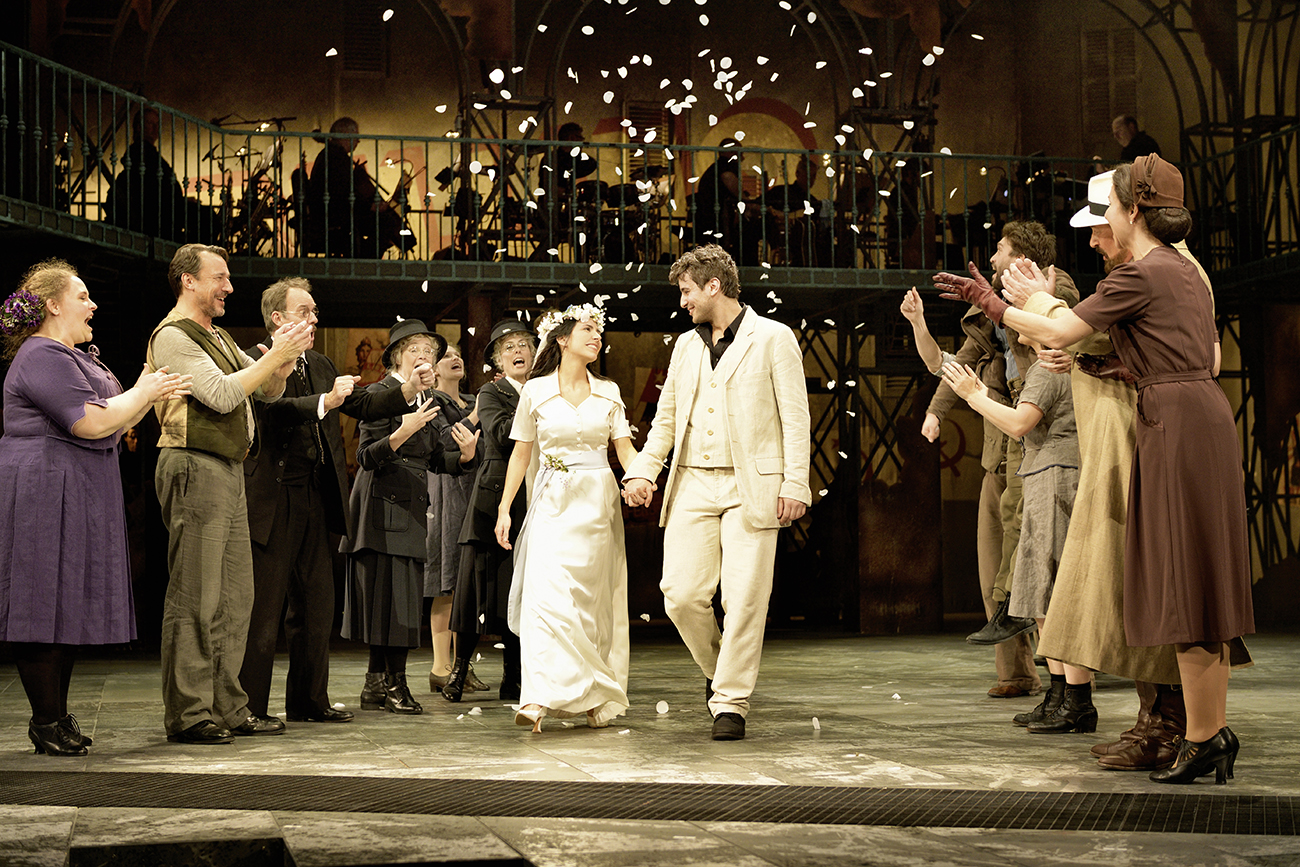Additional Tracks
Full musical soundtrack CDs available on request. Please contact us for our promotion packages.
Introduction
DON CAMILLO & PEPPONE lovingly recreates the tales centred on the pugnacious Catholic priest Don Camillo and his no less bellicose antagonist Peppone as a joyous, light-hearted musical. It provides a reunion with charming, much-loved characters in an upbeat tale set in rural Italy in the 1950s, a tale of social optimism, mutual co-existence, tolerance and the power of reconciliation.
Don Camillo, Boscaccio’s village priest, is outraged. He gazes reproachfully up at the cross. “How could you let this happen?” Jesus replies that this is what democracy is about. After all, the poor have plenty of reasons for voting in a Communist mayor.
So begins our light-hearted musical about the Catholic priest Don Camillo and his rival Peppone, the new mayor of Boscaccio. It is 1947 and we find ourselves in a village in the North Italian Po Valley. This apparently sleepy little village is the setting for a battle between traditional values and the ideals of a social revolution. Not even Jesus can calm the furious priest down. In the war that has just ended, Don Camillo, unlike other clerics, fought with the partisans against the Fascists. Now he must fight against Peppone and his comrades. If necessary using the gun he has hidden in the sacristy.
The new mayor is no stranger to Don Camillo. They fought side by side when they were both part of the resistance to the now-toppled dictatorship. But Don Camillo vehemently rejects Peppone’s political views. His opponent’s attitude is equally vehement. Peppone sees himself as the representative of a new and better era. He is fighting for a better world, even if the Communist Party slogans he spouts sound odd coming from this man of the people. He considers the Church a force for evil, holding back progress.
These are our two combatants: the one cunning and eloquent, the other stubborn and intransigent. On Don Camillo’s side are the wealthy landowners and conservative churchgoers, while the poor labourers and progressive intelligentsia stand behind Peppone. Each side despises the other and this contempt not infrequently turns into burning hatred.
As long as it is confined to words, ideas and demands, the quarrel sows discord in the village, but nothing worse. But a devastating flood makes it clear that in an emergency they all need each other. When soon afterwards a strike threatens to destroy all the livestock, Don Camillo realises that uncompromising confrontation will plunge the village into calamity.
However, it is a pair of star-crossed young lovers who bring about the real change of heart. Gina, the daughter of rich landowner Filotti, is in love with Mariolino, the son of Brusco, a poor peasant farmer. As with Romeo and Juliet, their feuding families will go to any lengths to break up the relationship between their children. We all know how it ends in Shakespeare. Here, too, the young couple can see no way out except joint suicide. Fortunately, Don Camillo and Peppone find out in time that the pair intend to drown themselves. They sound the alarm and the whole village forms a search party. The despairing lovers are found just in time. The shock brings everyone to their senses. Boscaccio will never belong completely to either Don Camillo or Peppone. Instead of fighting each other, they will have to come to an understanding and learn to put up with each other.
Gina and Mariolino’s wedding does not resolve every quarrel between the villagers, but it is a festival of tolerance, celebrated in harmony by the entire village.
Success Story & Production Notes
An internationally chart-topping songwriting team
Drawn from stories that were bestsellers in 27 countries
A touching tale of clashing ideologies overcome for the common good
Grammy winner Michael Kunze, the most successful Germanlanguage musical author, lyricist and translator of his age (79 gold and platinum records!) teams up with Dario Farina, one of Italy’s foremost contemporary composers (pop hit “Felicita“, movie score for ROSSINI, to breathe new life into the muchloved cult figures of Don Camillo and his arch-rival Peppone. The first of Giovannino Guareschi’s short stories about the pair appeared in 1948, and the books became bestsellers in 27 countries. Countless adaptations have been made for cinema and television.
Now the pugnacious priest and equally hotheaded communist mayor lock horns on the musical stage, battling each other and the problems of life in post-war rural Italy in a new original musical comedy produced by VBW in association with Theater St. Gallen. The world premiere of this version of the classic tale of social upheaval, tolerance and the power of reconciliation took place in April 2016 in Switzerland, and the show opened in Austria to rapturous reviews at the Ronacher in Vienna in January 2017. Once again the VBW assembled a leading team of supreme talent and experience. In 2019 the production was staged in Tecklenburg, on the largest open air stage in Germany.
The evocative sets by Olivier Award and Drama Desk Award-winner Peter J. Davison (THE VISIT, REBECCA) reflect both the hardships and the hopes of 1950s rural Italy and are sympathetically lit by Michael Grundner (LES MISERABLES, JESUS CHRIST SUPERSTAR). Tony Award nominee Yan Tax (ELISABETH, MOZART! etc.) provides meticulously designed costumes, while choreographer Dennis Callahan (DANCE OF THE VAMPIRES, ELISABETH, MOZART!) returns to VBW with pulsating dance routines ranging from the enchanting to the violent! A welcome reunion with much loved characters, stirring, poetic and wise: a comedy to restore faith in the fundamental goodness of humanity!
Press Review
-
"Absolutely recommended.”
-
“Visually opulent.”
-
"Perfectly rehearsed - Director Andreas Gergen and conductor Koen Schoots ensure the show runs perfectly.”
-
“Standing ovations - a hugely enthusiastic reception.”
-
“The Italian comedy film makes a splendid musical.”
-
“An entertaining and atmospheric evening, haunting ballads, excellent sound design, brilliantly directed by Andreas Gergen. Resounding applause at the Ronacher.”
Credits & key facts
- World premiere:
2016 Switzerland / St. Gallen (VBW in co-production with Theater St. Gallen)
- Stage Rights:
© 2008 AHN & SIMROCK Bühnen- und Musikverlag GmbH, Hamburg,
www.ahnundsimrockverlag.de
Licensing: VBW International GmbH in cooperation with AHN & SIMROCK Bühnen- und Musikverlag GmbH (except USA, Great Britain and Australia)
- Book & Lyrics:
Michael Kunze
- Music:
Dario Farina
- Musical Supervisor & Orchestrations:
Koen Schoots
- Based On:
Il Mondo Piccolo by Giovannino Guareschi
- Director:
Andreas Gergen
- Choreography:
Dennis Callahan
- Set Design:
Peter J. Davison
- Costume Design:
Yan Tax
- Lighting Design:
Michael Grundner
- Sound Design:
Thomas Strebel
- Puppet Design:
Stefan Fichert
- Musical Director:
Koen Schoots
- Visitors worldwide:
almost 140.000
- Shows worldwide:
almost 180
- Countries:
Austria, Germany, Switzerland
- Language versions:
German
Main Characters
-
Don Camillo
The smart and pugnacious priest of Boscaccio, a small village in rural Italy, is everything but a quiet clergyman. Quite the contrary, he is as sly as a fox and an eloquent, clever and skillful tactician trying to fulfill God’s plans on earth. He is driven by his sense of justice and his firm belief that he has to save his parish from communism. The play’s main character was inspired by Alessandro Parenti, the priest of the small village of Trepalle, with whom author Guareschi frequently met when writing the stories of Don Camillo. The protagonist’s name on the other hand derives from Don Camillo Valota, a Roman Catholic priest, partisan and former prisoner of the concentration camps of Dachau and Mauthausen.
-
Peppone
The mayor of Boscaccio, Giuseppe Bottazzi, better known by his nickname ‛Peppone’, is a down-to-earth but also very stubborn man who has fought his way up from his poor upbringing. He sees himself as the representative of a new and better time. He’s not a big talker but he knows (or at least thinks he knows) what is just and what is not. The communist jargon sounds quite strange coming from his mouth. He considers the church an obscure power which prevents progress. He is also convinced that his way is the only way.
-
Gina
The good and well-behaved daughter of the rich land-owner Filotti had a very strict and Catholic upbringing. Despite her family background she refuses to understand why she is not allowed to talk to the neighbor’s son Mariolino. Already when they were young the two of them often secretly met at a breach in the wall between the two properties. As they grow older their friendship turns into love. But their ill-fated relationship almost leads the two lovers in despair to suicide. Gina also acts as the narrator of the story looking back at an eventful life full of highs and lows including an unforgettable first love.
-
Mariolino
The son of the impoverished Brusco is an introvert loner. He is smart and ambitious but also a dreamer. He is captivated by the ideas of communism and refuses to be treated as a second class citizen only because he is poor. Nothing irritates him more than the condescending behavior of the establishment, the class the town’s priest belongs to. He is however not a typical class warrior. He dreams of leaving the real world behind to go and live on a lonely island with Gina.
-
Laura Castelli
Laura Castelli is a teacher and an intellectual socialist from Milan. Considering the times she lives in, she is a very emancipated woman who acts free from prejudice and sees the people and problems of the little town through the eyes of an outsider. She falls in love with old Nonno who thanks to her comes back to life several times during the play and eventually even ends up marrying him.
-
Brusco
Mariolino’s father Brusco has always been on the losing side of life. His fight against hunger has made him bitter. He is very stubborn and is eaten up with envy of his neighbor Filotti’s wealth. He has strictly forbidden his son to see Filotti’s daughter Gina.
-
Nonno
Gina’s grandfather was the notary of the town. He is presumed dead and miraculously rises from his grave several times during the play. He is very smart, funny and ironic. He was a charmer and womanizer all of his life and still enjoys to flirt. And thanks to his good looks he is still successful with the ladies.
Synopsys
“Miracles can happen.“
-
Act I
A new mayor and a divided village
Shortly after World War II the situation in the Italian village Boscaccio changes. The communists obtained the majority at the elections and Peppone is the new mayor. This is bad news for the village priest Don Camillo, who regularly communes with Jesus, as he fears to lose his dutiful parishioners due to the new political leadership.
Gina, the daughter of the catholic landowner Filotti, and Mariolino, the son of the communist Brusco, whose different political convictions regularly lead to heated discussions but also passionate spectacles, meet at the piazza. Unexpectedly Don Camillo is called to the house of Filotti, where grandfather Nonno is on his deathbed. But once the attractive teacher Laura Castelli appears the old Nonno does not want to die anymore.
At the local council meeting in the town hall Peppone decides to raise a monument to the working man. In the church tower Don Camillo is reflecting on his community when suddenly Peppone asks him for a ceasefire. But the two cannot stop quarrelling. The conflict escalates when Laura asks Don Camillo to baptise the son of Peppone with the name Lenin. Only Jesus can persuade Don Camillo to agree to a compromise with the mayor. The hate between Filotti and Brusco culminates in building a fence to separate not only their lands but also their children from one another. At the piazza Peppone indulges in his memories.
A holy vandal?
At night Don Camillo is sneaking over the marketplace where only a few cats are straying. In the morning the villagers discover that the decree announcing the construction of the memorial is overwritten with the word „donkey” and are amused about the eternal rivalry between the priest and the mayor. Peppone, who already knows who is behind this act, asks Don Camillo due to his writing disability to help him writing a manifest against the culprit. While Laura persuades Peppone to complete his school graduation, Gina and Mariolino dream at the river from afar.
The discovery of an old regimental cashbox comes at the right time for the communists. But when Laura states that it is worthless money from the Mussolini era that only belongs to the state, all agree to firstly keep this discovery secret.
On Sunday Don Camillo, who prohibited the wear of communistic flags at the procession, starts his way to the river blessing firstly alone. But although even the communists join him by and by Don Camillo wishes angrily for a flood.
-
Act II
A miracle and mutual favours
Due to the continuous rain the river threatens to overflow. The communists make Don Camillo responsible, whilst the catholics blame Peppone. Whereas the mayor tries to evacuate the village, the priest calls people to believe.
The village is desperately regretting its incredulity. Once the flood really stays away everyone believes in a miracle. But Laura knows that Don Camillo must have heard about the closure of the dams on the radio. She offers him to undo his deceit by exchanging the money from the regiment cashbox and pretending that it is from the offertory. But Peppone only convinces Don Camillo, when he promises him a share of the found money for the renovation of his church tower.
At a joyful celebration at the piazza Nonno is losing his strength again. But when Laura reaffirms how much she would miss him he postpones his own death again. During the final examination Don Camillo is handing over Peppone the answers for the questions - albeit only in exchange to his promise to take over the costs for the new church bell.
There is a lot of excitement in front of the town hall: Due to the fact that Filotti wants to distrain the farmyard from his tenant, Peppone calls for a strike. Only after days Don Camillo can convince Peppone to secretly milk the cows. And also Filotti lets himself be finally persuaded by Don Camillo, so that the strike is declared as finished and the victory of Peppone is celebrated.
Lovers saved abd a village united
In the evening Gina and Mariolino desperately ask the priest to marry them. But when they hear that the approval of Gina‘s parents is necessary they lose hope and run away. Shortly after that Filotti arrives excitedly with a message of them at Don Camillo. He fears that his daughter and Mariolino are on the way to the river to end their lives.
While the whole village of Boscaccio is searching for Gina and Mariolino, they swear eternal love and intend to die together. At the last moment some villagers pull them out of the water. When Brusco and Filotti quarrel again Don Camillo and Peppone put them with joined forces in their place. Don Camillo affirms the wedding of Gina and Mariolino, which finally takes place at the piazza of Boscaccio - this time without any dispute.















